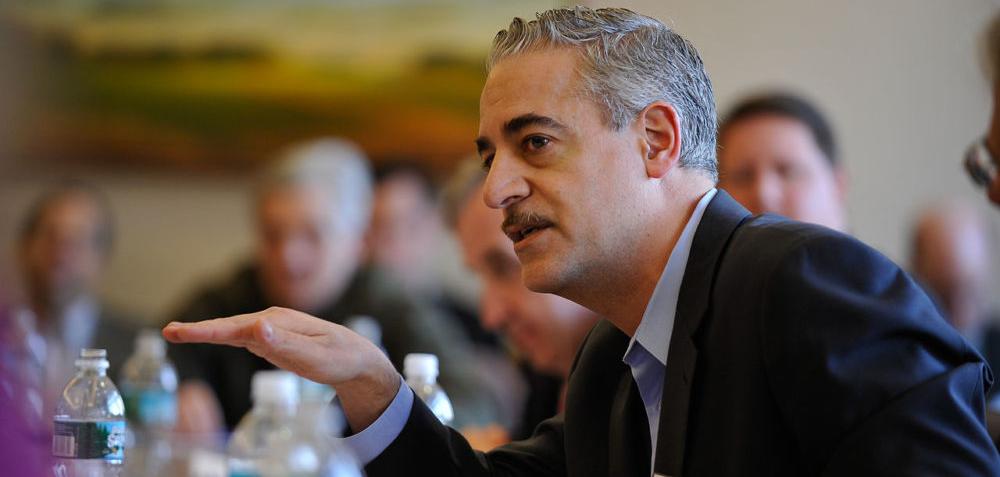Since PRA’s 2016 report on Massachusetts’ most notable conservative think tank, the Pioneer Institute has taken on public sector unions not just in Massachusetts but across the entire country. Recent legal challenges to public sector unions have prompted the Pioneer Institute to re-brand and initiate specific legal tactics to expand on their long-standing criticism of public sector unions.
For Pioneer Institute Executive Director Jim Stergios, taking aim at public sector unions is not new. Pioneer is a member of the State Policy Network, which is a Koch-funded network of conservative organizations seeking to “cut red tape, [reduce] government union power, and [protect] free speech for all Americans” by pushing policies like right-to-work laws on the state level. And in 2011, Stergios released a report critiquing public teacher contracts, calling them “rule-bound” and a “recipe for teaching and therefore student failure.” He recommended taking the ability to collectively bargain for benefits for public school teachers, an essential union function, “off the table”.
Fast-forward to today, and our nation is grappling with an intensely polarizing federal Supreme Court case that could potentially devastate public sector unions. What’s at stake with Janus v. American Federation of State, County, and Municipal Employees (AFSCME) is far beyond any right-to-work law: if the court rules in favor of Janus, public sector unions will cease to be able to collect any funding at all from contract beneficiaries who opt out of the union. The case was brought on by an Illinois social worker who claimed that the agency fee he was obligated to pay his workplace’s union (AFSCME) violated his First Amendment rights. Mark Janus stated that he did not share the same political views of the union and claimed giving any sort of money to the union meant he would be funding their political activity because everything a public sector union does is inherently political. A ruling in favor of Janus would eviscerate funding for key union functions like organizing, bargaining, and administration. Meanwhile public sector workers in unionized workplaces who opt out of helping to fund the collective bargaining activity of the union will still benefit from the fruits of their collectively bargained contracts, such as wage structures and retirement benefits.
Along with other “free market” business organizations, the Pioneer Institute has used Janus and other recent court cases that attempt to roll back workers rights to employ more explicit legal strategies to push their ideologically anti-union positions. Before Janus was filed in 2017, there was enough momentum in both state and federal courts for the Pioneer Institute to premiere its legal initiative PioneerLegal in 2015. PioneerLegal describes itself as the “first public interest law initiative of its kind in Massachusetts” using a “litigation-based approach” to promote “economic freedom, government accountability and educational choice.” The initiative is lead by Pioneer’s senior fellow in law and policy John Sivolella, who is charged with producing “amicus briefs, open letters, legal research memoranda, FOIA filings, and suggested revisions to certain regulations and statutes.”
Within its first few amicus briefs, PioneerLegal quickly established itself as a reliably anti-union, conservative legal commentator, beginning with a state Supreme Court case in 2016. PioneerLegal wrote an amicus brief in support of the Commonwealth in SEIU Local 509 v. Massachusetts Department of Mental Health, wherein several union members argued DMH had violated the Taxpayer Protection Act by failing to provide a proper cost-benefit analysis before awarding public contracts to private providers. Sivolella called the suit an attempt to cast a “legal cloud” on privatization by burdening private entities with regulations. However, the sole purpose of the law is to ensure that taxpayer dollars are not so easily spent on private contracts without a thorough consideration of the relative cost effectiveness of privatizing such services rather than keeping them within the public’s control. Furthermore, dismantling any “barriers to privatization” is the first step to circumventing essential public sector union contracts in exchange for largely non-union, undervalued labor.
Currently with the Janus case, PioneerLegal has again joined the ranks of the many other conservative anti-union legal organizations and think tanks from across the country on the national stage. In July 2017, PioneerLegal joined an amicus brief prepared by the Pacific Legal Foundation, the nation’s oldest conservative legal organization, which calls agency fees an “infringement of individual rights.” The amicus brief argues that public sector unions are inherently political because they get to decide on how public dollars are spent outside of the legislative process. As such, they argue any person who funds the union at all is also expressing their political views. To require employees to help fund the union’s activity then is “compulsory” and contrary to that employee’s First Amendment rights.
To add to this anti-worker refrain, Pioneer Institute’s own Executive Director Jim Stergios stepped out of his normal role of commenting on Massachusetts-specific issues to state that unions across the country are are “coercive” and “monolithic.” To regard democratically-elected unions as such is to betray the individual liberties that give legitimacy to union representation in the first place. Unions are voted in by the workers and they can certainly be voted out at any time. Creating a backdoor to these democratic processes by doing away with agency fees altogether is to undermine that democracy process. This fact however is inconvenient for Pioneer’s vision of a “free market” which supposedly prizes individual liberty. Because at its core, what “free market” really means is a market without unions. And now with PioneerLegal, the Pioneer Institute can bring their anti-union message to the courts at the state, and as the Janus brief demonstrates, federal level. Time will tell whether Pioneer Legal will sign or perhaps write further amicus briefs aimed at undermining the rights of workers across the country.

